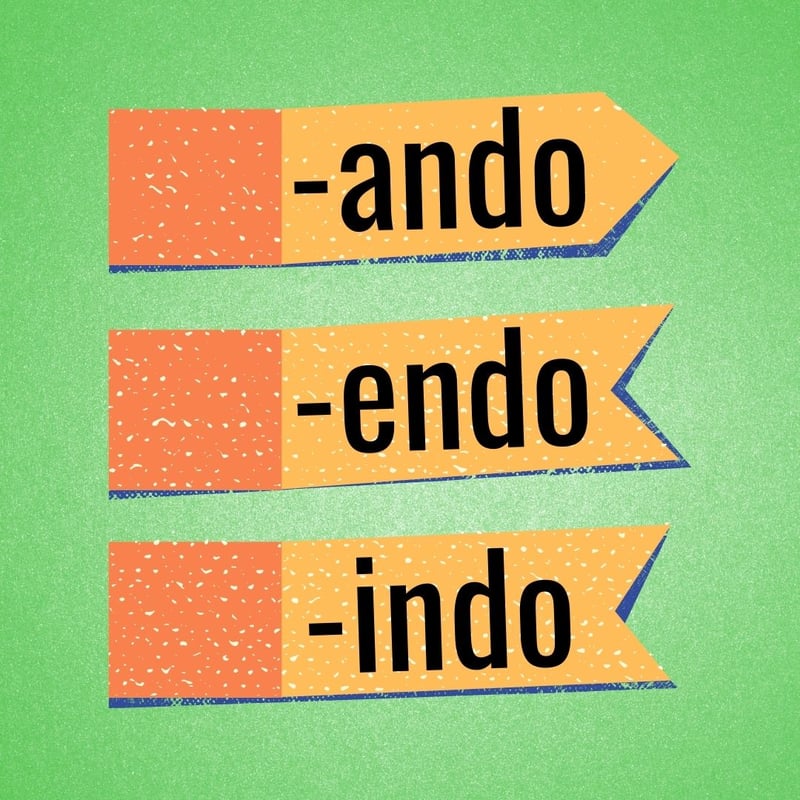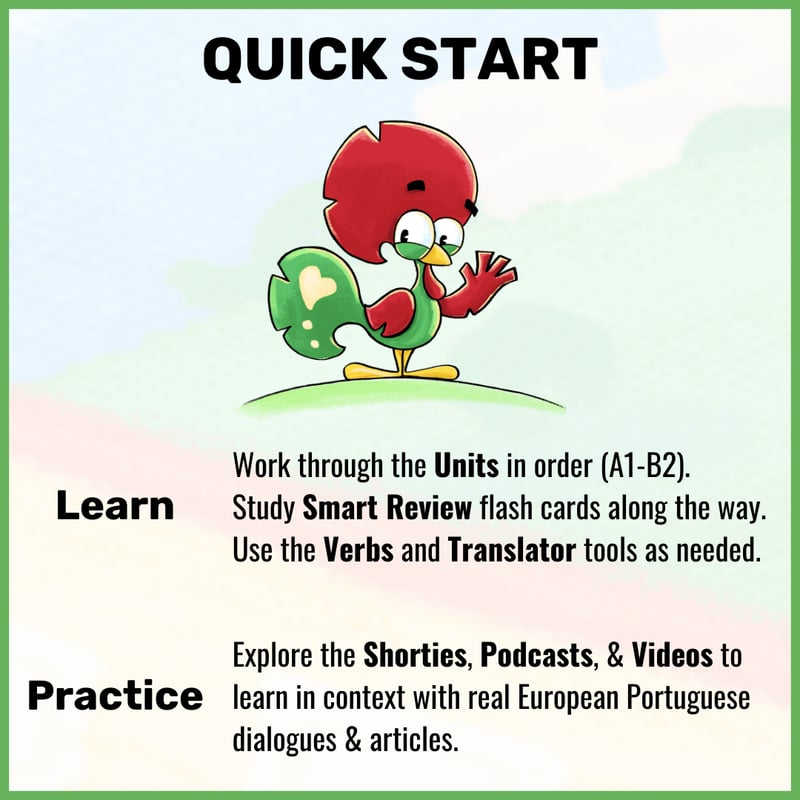In this Learning Note, we’ll present a lot of Portuguese vocabulary related to different family members and loved ones. Then you can practice using these new words in the Lessons that follow. You may wish to add some of these words to your Smart Review, depending on which members of you like to talk about […]
Family Members in Portuguese
Choosing Between Portuguese Prepositions
When you start learning about Portuguese prepositions, you’ll quickly realize that the translation is very dependent on context. This makes it tricky for non-native speakers to determine which preposition to use. In this Learning Note, we’ll review some commonly confused prepositions to help clarify these distinctions. Place: When to Use “A” vs “Em” The preposition […]
Portugal’s Love Affair with Bacalhau
In addition to being one of the most difficult Portuguese words for foreigners to pronounce correctly, is Portugal’s most treasured dish and it is highly associated with its national identity.
Travel to Madeira – Tips and Vocabulary
~ Written by Edyta of the blog Say Yes to Madeira. Explore her blog for a complete guide to what Madeira has to offer! When visiting the Madeira archipelago, you will have a chance to learn some interesting vocabulary. Here are some useful words you will often encounter, plus a pronunciation guide to the island’s […]
The Galo de Barcelos
can be seen pretty much all over Portugal, especially in those cute little souvenir shops. Usually the galo comes in ceramic form, but you will also see it embroidered on towels and aprons, in woodwork, and even on key-chains! The most common version of the Galo de Barcelos is black with colourful dots and red […]
Writing an Email in Portuguese
Ever wondered how to start and end an email in Portuguese? It’s not always as simple as translating the phrases you would use in your native language. What sounds friendly or formal in one language might sound rude or unusual in another. And you don’t want to greet a friend the same way you greet […]
Basic Portuguese Grammar
This Learning Note was designed to serve as a very condensed overview of basic Portuguese grammar. We hope this will help give you a “big picture” view of the language before you dive into the details. You’ll notice there are many links throughout, in case you want to explore a particular topic, or bookmark it […]
Portuguese Clothing Vocabulary
Whether you’re going shopping for new clothes or you just want to talk about what you’re wearing, it’s helpful to know some vocabulary for basic clothing items in Portuguese. Get Dressed! First, let’s cover which verbs we can use to talk about getting dressed. Usar can be confusing because it also means to use, but […]
Auxiliary Verbs
Let’s talk about an important topic: Portuguese auxiliary verbs! In a verb phrase (locução verbal), an auxiliary verb comes before the main verb. Essentially, its job is to “help” the main verb. Most Common Portuguese Auxiliary Verbs Here are a few of the most common , which you will probably recognize: Here are just a […]
The Many Meanings of “Pois”
You’ll probably come across the word pois a lot when learning European Portuguese. It can be confusing for non-native speakers because it’s used in many different contexts and can have a wide variety of translations. Once you get the hang of it, pois is a very versatile word. It appears as a conjunction, an adverb, […]
The Gerund
It’s time to learn how to use the gerund in European Portuguese! 🥳 Simples vs. Composto So what is the exactly? For English speakers, it generally corresponds to the verb form ending in -ing, when it is used as a noun (e.g. “I like cooking“). However, the Portuguese gerund plays a different role, which is […]
Pronunciation Variations
After exploring the Pronunciation Guide for European Portuguese Vowels and Pronunciation Guide for European Portuguese Consonants, you probably had a better sense of how to pronounce the various sounds of Portuguese in isolation. However, when you listened for these sounds throughout the Units and in the Shorties, you may have heard some things you didn’t expect! […]
Demystifying the Word “Logo” in Portuguese
You may have come across the word logo in Portuguese and had trouble translating it. Logo is another of those Portuguese words that has several meanings… The word can mean “therefore”, it can mean “soon”, and (don’t hate us!) it can also mean “later”. 😳 Sometimes it does not have a clear translation in English, […]
Relative Determiners – Cujo
Let’s talk about relative determiners! There is only one relative determiner – cujo (and its variants). This is a relatively recent change to the terminology, so you may find a lot of articles that list cujo as either a relative pronoun or a quantifier, but this is incorrect. Relative determiners always agree in number and […]
How to Pronounce R in European Portuguese
The Portuguese R is one of the more difficult sounds to master. We covered it briefly in our Pronunciation Guide to European Portuguese Consonants, but it deserves a bit more explanation! Pronunciation varies across different Portuguese dialects, so you will likely hear variations in the the R (as well as other sounds). We’ll focus on […]
How to Say Large Numbers in Portuguese
In the next couple lessons, we’ll let you practice with large numbers, such as those in the ten-thousands and hundred-thousands. A few reminders: – Remember that 100 is cento when it’s part of a number (i.e. followed by e) – Remember that 100 is just cem when it’s by itself (i.e. not followed by e) Here’s […]
How to Use the Verb Andar
The simplest translation for the Portuguese verb andar is “to walk”, but the fun doesn’t stop there! Andar can take on many different meanings, depending on the context. As opposed to , which is pretty straightforward, refers more to the general act of moving, acting, or changing places. It can indicate that an action is […]
Portuguese-English Cognates
Learning Portuguese-English cognates is a great way to build vocabulary fast! It’s basically using what you already know to get a jump-start. Cognates are simply words that are very similar in both languages, usually due to a common root. We talked about them in our guide to European Portuguese Shortcuts, as well as our video […]
False Cognates
False cognates, also known as , are words that look and/or sound similar in two different languages, but that don’t actually have the same meaning. In other words (no pun intended), they “trick” you into thinking they are true cognates. Let’s start with what’s most important: making sure you don’t run into any doors when […]
Having a Basic Conversation in Portuguese
In the next set of , we’ll introduce phrases that will help you have a basic conversation in Portuguese. Many beginners are afraid to initiate a because they don’t know whether they’ll understand or be understood. Well, we wouldn’t recommend discussing politics right away 😳, but with some preparation, you can at least get further […]
Poder vs. Conseguir
Some Portuguese verbs have such similar meanings that it can be quite confusing for learners to know which to use in different contexts. Two of these tricky verbs are and . In this Learning Note, we’ll cover how to distinguish between poder vs. conseguir.
Where Are You From?
In this Learning Note we’ll cover 3 main topics: 🗺 Countries in Portuguese (so you can say where you’re from!) 🤓 Whether to use a definite article (o or a) before the name of your country 🗣 How to state which language(s) you speak and your nationality (both male and female forms) You may have […]
How to Practice Portuguese
Before you jump right in, we wanted to give you an overview of how to use our platform to learn 🇵🇹 ! You can use the menu to navigate. The 2 most important sections are Learn and Practice: Next, we’ll discuss each section in more detail. If you’re too excited for all this explanation, scroll […]
Word Order in Portuguese Questions
Word order is fairly flexible when it comes to Portuguese questions, so let’s review the possibilities. Then we’ll introduce one more option that you haven’t seen yet. Yes/No Questions Word Order 1. Add a question mark to the end of a statement 2. Add a phrase like “não é?” to the end of a statement […]
























